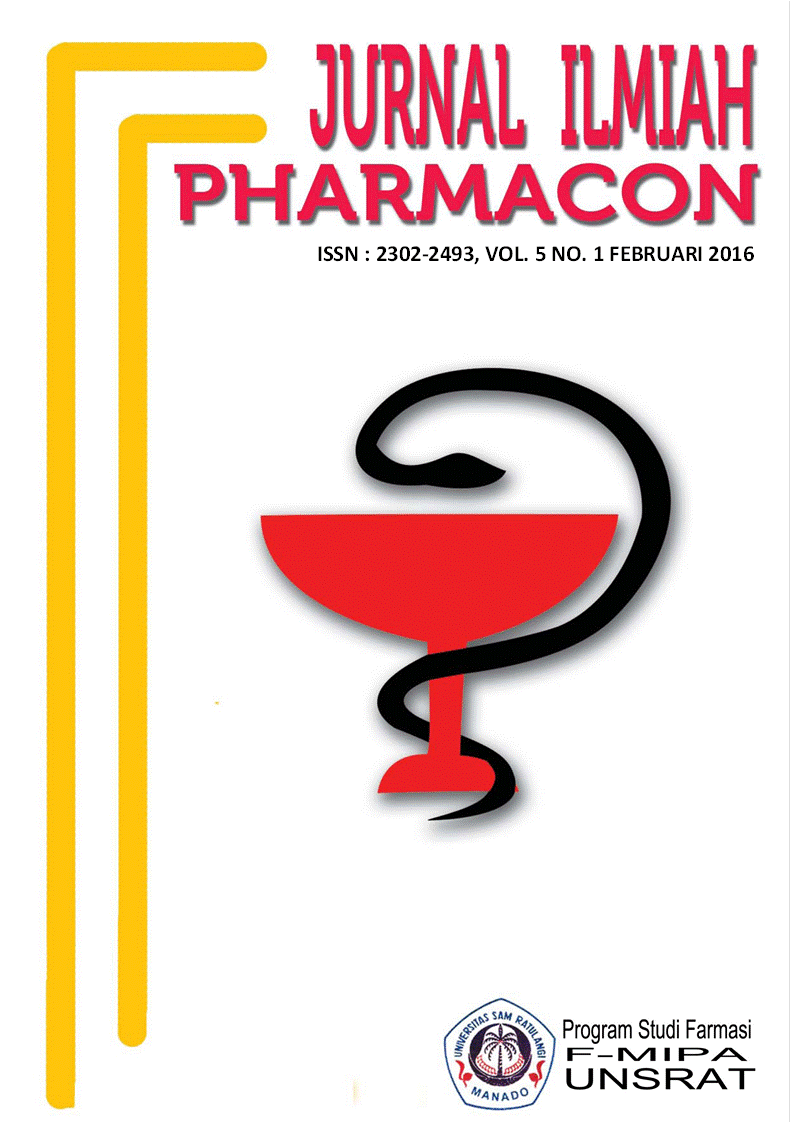HUBUNGAN ANTARA ASUPAN ENERGI DENGAN STATUS GIZI PADA PELAJAR DI SMP KRISTEN TATELI KECAMATAN MANDOLANG KABUPATEN MINAHASA
DOI:
https://doi.org/10.35799/pha.5.2016.11252Abstract
HUBUNGAN ANTARA ASUPAN ENERGI DENGAN STATUS GIZI PADA PELAJAR DI SMP KRISTEN TATELI KECAMATAN MANDOLANG KABUPATEN MINAHASA
Vallen I. Wawointana1), Nancy S.H Malonda1), Maureen I. Punuh1)
1)Fakultas Kesehatan Masyarakat Universitas Sam Ratulangi Manado
ABSTRACT
Adolescence is a period that is considered vulnerable nutrition. Nutritional problems in adolescents arise because the wrong nutritional behavior, namely the imbalance between nutritional intake with the recommended dietary allowance. Nutritional problems that can occur in adolescents is malnutrition (under weight), obesity (over weight) and anemia. Based on data from basic medical research (Riskesdas) in 2010, a presentation of nutritional status in adolescents aged 13-15 years according to the categories of body mass index (BMI) of North Sulawesi very meager 0.7%, 5.3% underweight 90.5% normal and 3.4% fat. From this data, obesity is high compared with the average Indonesia is 2.5%. Research was in SMP Kristen Tateli Kecamatan Mandolang Kabupaten Minahasa, conducted in September-December 2015, and this type of research using analytic survey research with cross-sectional design. Total sample of 11 respondents who meet the inclusion and exclusion criteria. Types of data collected used interview, 24-hour food recall questionnaire and Anthropometric measurements (Height and Weight). The results of this study indicate that the nutritional status were quite as many as 95 students (81.2%) and as many as 67 students (57.3%) had a good energy intake. From these results it can be concluded that there is a relationship between energy intake and nutritional status based on test spearmen correlation r = 0.183 and p = 0.048 (p <0.05).
Key Words : Adolescence, Energy Intake, Nutritional Status
ABSTRAK
Usia remaja merupakan periode yang dikategorikan rentan gizi. Masalah gizi pada remaja muncul dikarenakan perilaku gizi yang salah, yaitu ketidakseimbangan antara konsumsi gizi dengan kecukupan gizi yang dianjurkan. Masalah gizi yang dapat terjadi pada remaja adalah gizi kurang (under weight), obesitas (over weight) dan anemia. Berdasarkan data riset kesehatan dasar (Riskesdas) tahun 2010, presentasi status gizi pada remaja umur 13 – 15 tahun menurut kategori Indeks Masa Tubuh (IMT) untuk Provinsi Sulawesi Utara 0,7% sangat kurus, 5,3% kurus 90,5% normal, dan gemuk 3,4%. Dari data ini obesitas tergolong tinggi dibandingkan dengan rata-rata Indonesia yaitu 2,5%. Penelitian ini dilakukan pada pelajar di SMP Kristen Tateli Kecamatan Mandolang Kabupaten Minahasa, dilakukan pada bulan September – Desember 2015 dan jenis penelitian ini menggunakan  penelitian survey analitik dengan desain cross-sectional. Jumlah sampel 117 responden yang memenuhi kriteria inklusi dan ekslusi. Jenis data yang dikumpulkan menggunakkan metode wawancara, kuesioner food recall 24 jam dan pengukuran Antropometri (Tinggi Badan, dan Berat Badan). Hasil penelitian ini menunjukkan bahwa status gizi yang cukup sebanyak 95 pelajar (81,2%) dan sebanyak 67 pelajar (57,3%) memiliki asupan energi yang baik. Dari hasil tersebut dapat disimpulkan bahwa ada hubungan antara asupan energi dengan status gizi berdasarkan uji korelasi spearmen r = 0,183 dan p = 0,048 (p < 0,05).
Kata Kunci : Remaja, Asupan Energi, Status Gizi
Â
Downloads
Published
How to Cite
Issue
Section
License
Authors who publish with this journal agree to the following terms:
- Authors retain copyright and grant the journal right of first publication with the work simultaneously licensed under a Creative Commons Attribution-NonCommercial 4.0 International License that allows others to share the work with an acknowledgement of the work's authorship and initial publication in this journal.
- Authors are permitted and encouraged to post their work online (e.g., in institutional repositories or on their website) prior to and during the submission process, as it can lead to productive exchanges, as well as earlier and greater citation of published work (See The Effect of Open Access)










